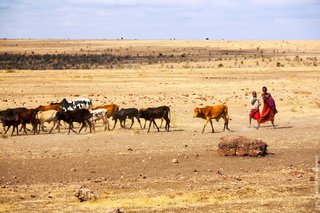A new study led by Uppsala University in Sweden, and with the cooperation of researchers at the University of Cologne’s Global South Studies Center (GSSC), has investigated how new sources of water affect nomadic pastoral communities in sub-Saharan Africa. They found that increasing water availability through the construction of new small water infrastructures (SWIs), such as deep wells and boreholes, can be counterproductive in the long term, resulting in greater harm to the farmers, their livestock, and the entire ecosystem. Rather than sustaining pastoral livelihoods, these interventions may actually reduce the resilience of these communities to climate, thus having the opposite effect of what the water infrastructure projects hoped to achieve. The results have been published in the article ‘Over-reliance on water infrastructure can hinder climate resilience in pastoral drylands’ in Nature Climate Change.
Millions of farmers in sub-Saharan Africa are affected by drought, which often leads to water crises, famine and migration. Drought is particularly disastrous in drylands, which typically experience great variation in precipitation, with short rainy periods followed by dry spells lasting for months. The communities in these areas mostly consist of nomadic livestock farmers. Seasonal movements of herds are the traditional strategy used by nomadic livestock farmers around the world to deal with drought.
In recent times, initiatives to improve the water infrastructure in arid areas have become more common. One of the strategies is to make deep wells and boreholes to extract water. “When you increase access to water in arid areas, often as an urgent emergency measure, it becomes easier for livestock owners to stay there longer. However, that in turn increases the demand for water and pasture for their animals to a level that is not there, and that risks having a severe impact on the population and reducing their resilience to drought and climate change,” said co-author Giuliano Di Baldassarre, Professor of Environmental Analysis at Uppsala University.
The team used qualitative methods of anthropological research in large arid areas in various African countries, and quantitative methods, such as data analysis and socio-hydrological modelling, in Angola. The researchers compared how the overall conditions in drylands look in terms of the extent of drought, access to water, soil conditions and population size. They examined statistics from the years 1954 to 2018 on the boreholes, shallow and deep wells created, when they were made and for what purpose. Most of the water infrastructure created had multiple functions and was intended both for household use and for livestock and irrigation. During 2021, the researchers followed eight nomadic communities in Angola and conducted in-depth interviews with 24 focus groups. The GSSC at the University of Cologne contributed by comparing the Angolan case study with other dryland pastoral systems in sub-Saharan Africa, including Namibia, and by contributing to the development of a model for the post-drought dynamics of pastoralists in relation to SWI.
The study shows that when access to water improves, thanks to new wells and boreholes, the need for water grows further. Both the human population and the livestock need more water, and the animals need more pasture. “It is not possible to guarantee access to water and there is a risk of even greater problems for livestock farmers if they settle more permanently in one place. Our study shows that measures aimed solely at increasing the water supply, without effective management, risk threatening the resilience of nomadic communities to drought and climate change, and this is happening at a time when drought is expected to increase in many regions in the coming decades,” Di Baldassarre concluded.
Media Contact:
Dr Diego Augusto Menestrey Schwieger
Department of Social and Cultural Anthropology
+264 814672944 (currently in Namibia)
diego.menestreyuni-koeln.de
Professor Giuliano Di Baldassarre
Department of Earth Sciences, Uppsala University, and Director of the Centre of Natural Hazards & Disaster Science
+46 18-471 71 62
giuliano.dibaldassarregeo.uu.se
Press and Communications Team:
Eva Schissler
+49 221 470 4030
e.schisslerverw.uni-koeln.de
Publication:
Piemontese, L., Terzi, S., Di Baldassarre, G., Menestrey Schwieger, D.A., Castelli, G., and E. Bresci: ‘Over-reliance on water infrastructure can hinder climate resilience in pastoral drylands,’ Nature Climate Change, https://www.nature.com/articles/s41558-024-01929-z DOI: 10.1038/s41558-024-01929-z
